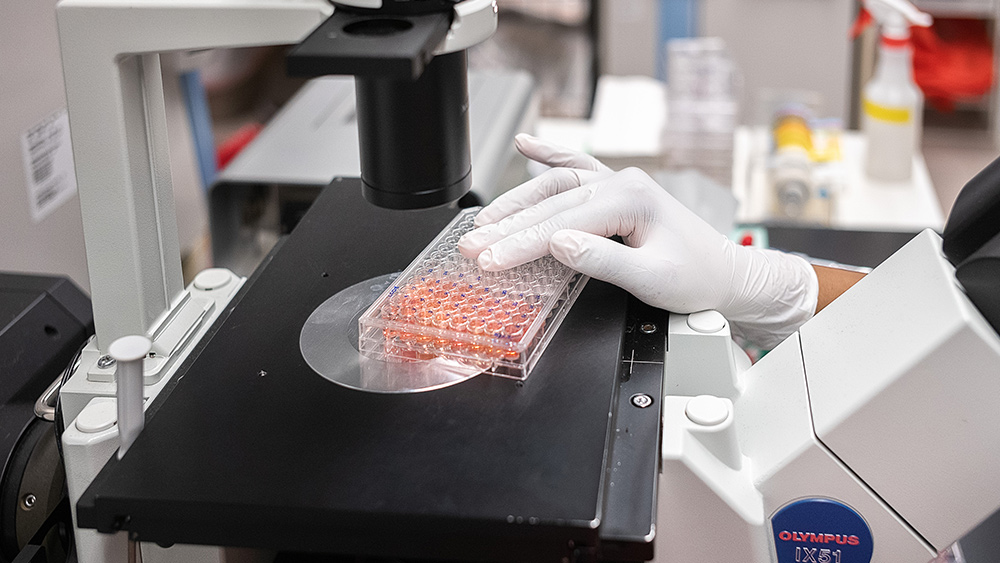Bombshell study finds likelihood of covid having natural origin to be less than 1 in 100 million
10/27/2022 / By Ethan Huff

Yet another research endeavor has deconstructed the myth that the Wuhan coronavirus (Covid-19) appeared out of nowhere as a random act of nature in late 2019.
A cohort of scientists from both the United States and Germany decided to take a closer look at SARS-CoV-2 using different methods than those that were already employed in earlier research looking at the unnatural origin of the virus.
What could very well become the smoking gun that leads to a solving of the case of where covid came from, the new paper, which appears as a pre-print in the bioXriv journal, confirms the presence of “endonuclease fingerprints” – endonuclease referring to enzymatic mechanisms of action – which would not otherwise be there if covid was a natural occurrence.
There is almost no chance, the paper confirms – just one in 100 million, to be precise – that the Chinese Virus just up and transferred, seemingly like magic, from animals – in this case bats – to humans. (Related: Chinese scientists confirmed from the very beginning that covid did not originate in bats at a wet market.)
“The genome of SARS-COV-2 contains a peculiar pattern of unique restriction endonuclease recognition sites allowing efficient dis- and re-assembly of the viral genome characteristic of synthetic viruses,” the study’s abstract explains.
Study confirms that covid is a feat of “synthetic genome assembly,” not “natural evolution”
The patterns identified by the research team in SARS-CoV-2 simply would not occur had the virus just mutated all on its own to suddenly develop the mysterious ability to transfer from bats to humans.

Something was intentionally done to it, presumably in a laboratory, to make the virus able to infect a human being. The paper describes this process as “synthetic genome assembly,” a type of bioengineering, as opposed to “natural evolution” as has long been claimed by the media.
“The restriction map of SARS-CoV-2 is consistent with many previously reported synthetic coronavirus genomes, meets all the criteria required for an efficient reverse genetic system, differs from closest relatives by a significantly higher rate of synonymous mutations in these synthetic-looking recognitions sites, and has a synthetic fingerprint unlikely to have evolved from its close relatives,” the paper goes on to state.
“We report a high likelihood that SARS-CoV-2 may have originated as an infectious clone assembled in vitro.”
It turns out that the newly uncovered research out of Boston, which claims to have synthesized a strain of covid bearing an 80 percent kill rate, used the same process that whoever created covid did to develop a deadly virus.
“Put another way, the Boston lab created a COVID-19 version of Frankenstein’s monster by piecing together different parts from different variants of the SARS-CoV-2 virus,” noted The Epoch Times.
Many have said it from the beginning: that covid is a monster created by some sort of deep state “Frankenstein” group of figures who planned to unleash it as a bioweapon upon the world. The new research adds another piece to the puzzle in solving the case.
For SARS-CoV-2, there are some 30,000 base pairs of RNA nucleotides present in its structure. However, all 30,000 of them could not have been pieced together all at once, meaning with the right technology it is possible, through careful analysis, to figure out that it was artificially constructed.
“The placement of wild segments in a virus (those longer than the created one) contain random information that will interfere with the infection process,” wrote a commenter, speculating as to what really happened.
“Hence the reason Anderson and Fauci wanted the origin narrative kept on the front page of media sites like Facebook & Twitter.”
Interested in keeping up with the latest news about covid’s origin? Visit Pandemic.news.
Sources for this article include:
Submit a correction >>
Tagged Under:
biological warfare, biological weapons, bioweapons, conspiracy, COVID, deception, endonuclease fingerprint, enzyme, lab origin, lab-leak theory, origin, Plandemic, research, science deception, Study, synthetic genome assembly
This article may contain statements that reflect the opinion of the author



















